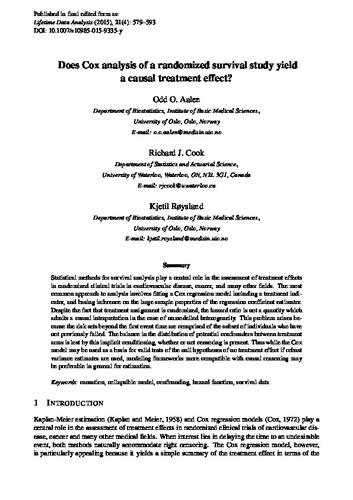| dc.contributor.author | Cook, Richard J. | |
| dc.contributor.author | Aalen, Odd O. | |
| dc.contributor.author | Røysland, Kjetil | |
| dc.date.accessioned | 2016-02-17 15:15:26 (GMT) | |
| dc.date.available | 2016-02-17 15:15:26 (GMT) | |
| dc.date.issued | 2015-10 | |
| dc.identifier.uri | http://dx.doi.org/10.1007/s10985-015-9335-y | |
| dc.identifier.uri | http://hdl.handle.net/10012/10265 | |
| dc.description | The final publication (Aalen, Odd O., Richard J. Cook, and Kjetil Røysland. Does Cox analysis of a randomized survival study yield a causal treatment effect?. Lifetime Data Analysis 21(4) (2015): 579-593. DOI: 10.1007/s10985-015-9335-y) is available at http://link.springer.com/article/10.1007/s10985-015-9335-y | en |
| dc.description.abstract | Statistical methods for survival analysis play a central role in the assessment
of treatment effects in randomized clinical trials in cardiovascular disease, cancer, and
many other fields. The most common approach to analysis involves fitting a Cox
regression model including a treatment indicator, and basing inference on the large
sample properties of the regression coefficient estimator. Despite the fact that treatment
assignment is randomized, the hazard ratio is not a quantity which admits a causal
interpretation in the case of unmodelled heterogeneity. This problem arises because
the risk sets beyond the first event time are comprised of the subset of individuals who
have not previously failed. The balance in the distribution of potential confounders
between treatment arms is lost by this implicit conditioning, whether or not censoring
is present. Thus while the Cox model may be used as a basis for valid tests of the
null hypotheses of no treatment effect if robust variance estimates are used, modeling
frameworks more compatible with causal reasoning may be preferable in general for
estimation. | en |
| dc.description.sponsorship | Canadian Institutes for Health Research (FRN 13887); Canada Research Chair (Tier 1) – CIHR funded (950-226626) | en |
| dc.language.iso | en | en |
| dc.publisher | Springer US | en |
| dc.relation.ispartofseries | Lifetime Data Analysis;21(4) | en |
| dc.subject | Causation | en |
| dc.subject | Collapsible model | en |
| dc.subject | Confounding | en |
| dc.subject | Hazard function | en |
| dc.subject | Survival data | en |
| dc.title | Does Cox analysis of a randomized survival study yield a causal treatment effect? | en |
| dc.type | Article | en |
| dcterms.bibliographicCitation | Aalen, Odd O., Richard J. Cook, and Kjetil Røysland. "Does Cox analysis of a randomized survival study yield a causal treatment effect?." Lifetime Data Analysis 21.4 (2015): 579-593. | en |
| uws.contributor.affiliation1 | Faculty of Mathematics | en |
| uws.contributor.affiliation2 | Statistics and Actuarial Science | en |
| uws.typeOfResource | Text | en |
| uws.peerReviewStatus | Reviewed | en |
| uws.scholarLevel | Faculty | en |

